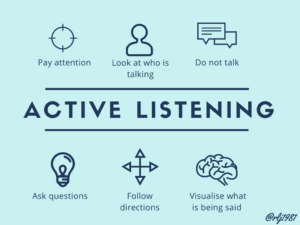October 19, 2017
Become A More Active Listener
The adoption process requires intense listening skills. And that means actively listening on such a level where you hear deeply what the other person is saying, and where they feel powerfully heard. This is especially the case with your child’s birth mother and your child, as they grow and begin to process their life, and experience challenging feelings and emotions. Listening, real listening, is incredibly difficult. Much harder than you would think. And so many alienate those around them by not being good listeners. We believe in this skill very much, and want to share with you a few tips for enhancing your active listening skills.
- Don’t speak. So often when listening to others we want to jump in with “me too!” and “I’ve been there!” to let the other person know we understand what they’re going through. But that takes the attention off the individual. It completely interrupts their thought process and restricts their voice. When you are truly listening, you aren’t thinking about what you’re going to say next, or how you can relate. That type of mental distraction is palpable and will stifle your loved one’s ability to safely communicating with you.
- Don’t multi-task. We are a dreadful culture of multi-taskers. How many times have you sat on the phone with someone and at the same time scrolled through Facebook on the computer, or had the TV on low in the background, or was looking up stuff on your iPad? That’s not listening. It’s a clear distraction, and it is very audible to the other individual.
- Make eye contact. Non-verbal communication is vital when it comes to listening. Not making eye contact, crossing your arms, sitting in a closed-off way, keeping your head down—none of these gestures communicate openness and engagement. Focus on opening up your body to the person who’s talking. You can communicate so much in silence.
- Ask questions. This one is so important. Often people are not actually looking for advice. They just want to vent, to be heard. Asking questions shows you’re listening, and it encourages them to go deeper. You could help them uncover a great deal about what they’re feeling, just by asking them more about what they’re saying. Ask thoughtfully, without judgement, and without anticipating how you’re going to respond.
- Allow room for silence. There is not enough silence in conversation, and silence is where the real discoveries occur. When you accept silence, you also accept that you’re not going to try and fill it. You don’t have to say anything to offer support. Just hold space. Observe what happens. It will change the way you hear your loved ones.



